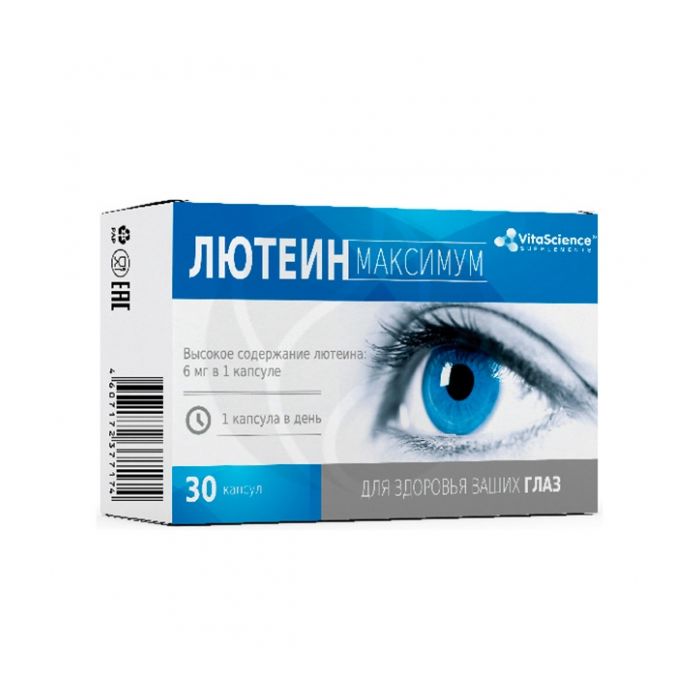VitaLife Lutein Maximum capsule dietary supplement, No. 30
Expiration Date: 05/2027
Russian Pharmacy name:
VitaLife Лютеин Максимум капсулы БАД, №30
Recommended as a biologically active food supplement - an additional source of lutein.
Adults, 1 capsule daily with meals.
Duration of admission is 1 month.
Carrier: microcrystalline cellulose, lutein (carrier: modified starch; corn starch, glucose syrup, lutein, antioxidants: sodium ascorbate, DL-alpha tocopherol), gelatin capsule (gelatin, dye: titanium dioxide E171, dye: yellow E110), anti-caking agent : silicon dioxide amorphous; anti-caking agent: magnesium stearate.
Individual intolerance to the components,
pregnancy, breastfeeding.
It is recommended to consult a doctor before use.
Lutein is an organic carotenoid that helps maintain healthy vision.
Lutein serves as the main visual pigment of the so-called 'macula' of the retina, which is responsible for the function of vision and its acuity, provides a clear and high-quality differentiation of the details of objects.
It is also part of the iris, lens, ciliary body and choroid. Lutein accumulated in the retina forms a light filter that protects it from the harmful effects of light rays of the visible (blue, violet) and invisible (ultraviolet) parts of the spectrum. At the same time, unlike other carotenoids, lutein acts as one of the most effective inhibitors of free radicals, exhibiting high antioxidant activity and retinoprotective properties.
Lutein Maximum has a high lutein content (120% of the consumption level). It provides the organs of vision with this essential substance and helps to create its reserves in the body.
Taking lutein will be beneficial for:
- in case of blunt eye trauma of varying severity and accompanying visual impairments, as part of complex therapy;
- with age-related macular degeneration;
- in order to reduce the risk of development and progression of age-related degeneration of the 'macular' of the retina;
- in order to stabilize visual functions in patients with retinitis pigmentosa and Usher's syndrome;
- to prevent the development of cataracts, as well as to reduce the risk of surgery for cataracts;
- with diabetic retinopathy;
- to enhance neuroprotective protection in ischemic retinal lesions;
- with retinal edema, hyphema: hemorrhages in the anterior chamber of the eye;
- in order to reduce the development of age-related changes in vision, in particular, retinal dystrophy;
- to prevent the development of certain cardiovascular and oncological diseases, rheumatoid arthritis - in cases where the concentration of lutein in the blood plasma is reduced;
- with increased visual stress, arising, in particular, while working at a computer, in libraries, archives, rooms with insufficient illumination, writing;
- with the threat of oxidative stress;
- practicing winter, as well as some summer (water) sports (windsurfing, yachting, etc.) - due to the fact that large snow and water surfaces almost completely reflect ultraviolet radiation damaging the retina;
- for the purpose of general improvement of vision, increasing its acuity and other qualities.

